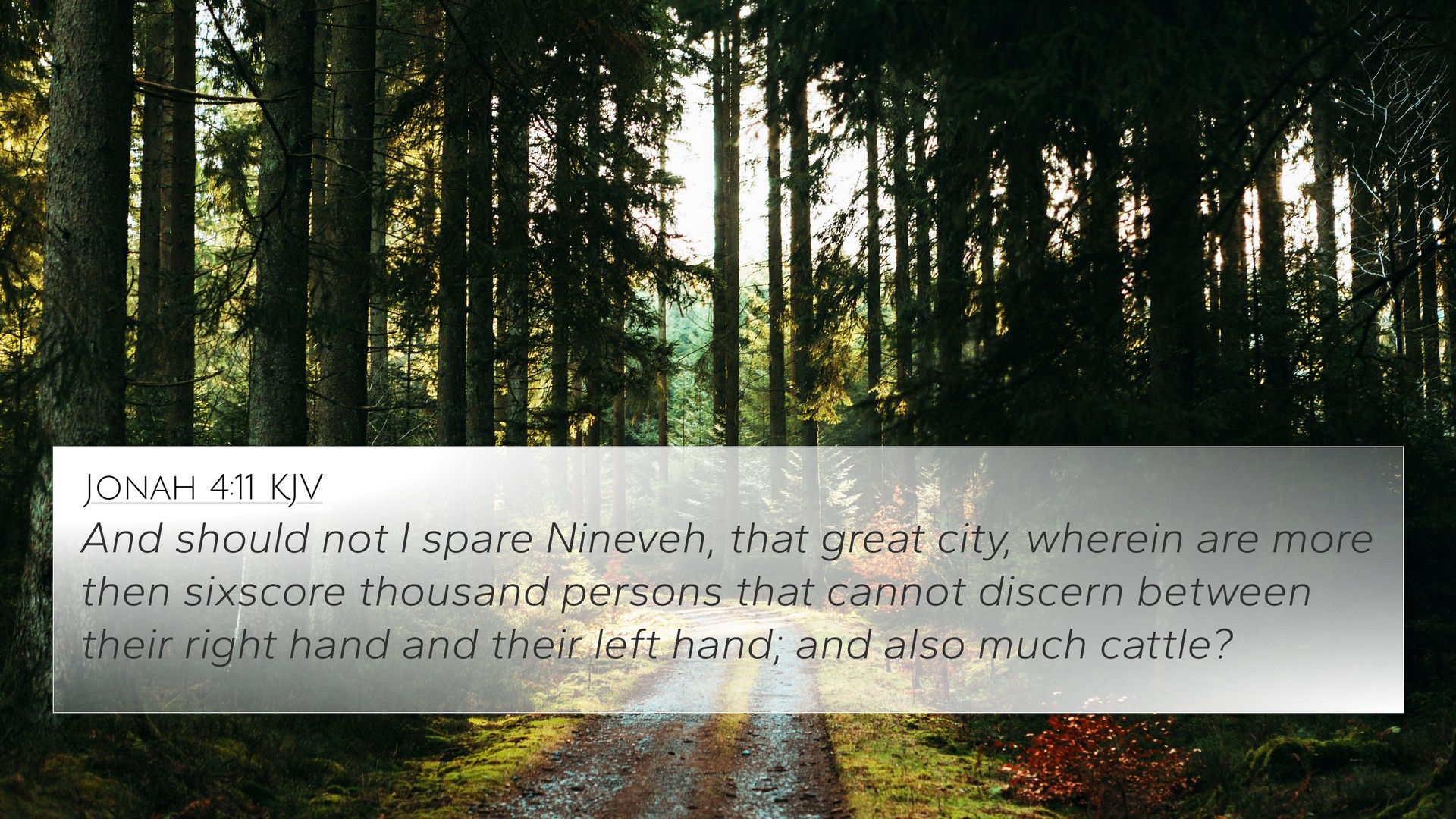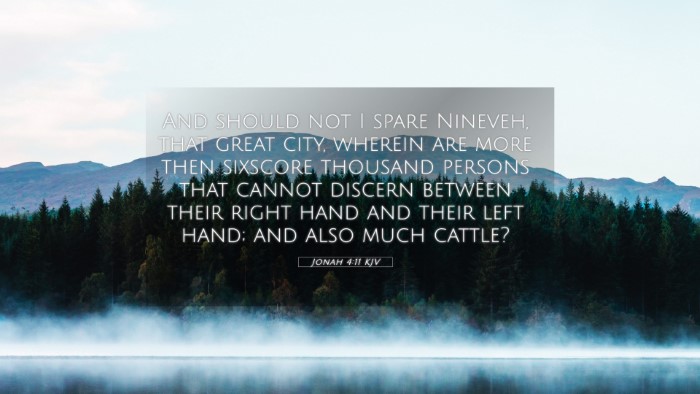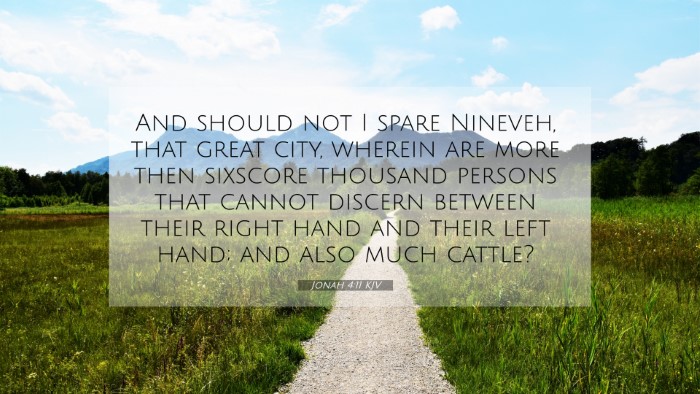Old Testament
Genesis Exodus Leviticus Numbers Deuteronomy Joshua Judges Ruth 1 Samuel 2 Samuel 1 Kings 2 Kings 1 Chronicles 2 Chronicles Ezra Nehemiah Esther Job Psalms Proverbs Ecclesiastes Song of Solomon Isaiah Jeremiah Lamentations Ezekiel Daniel Hosea Joel Amos Obadiah Jonah Micah Nahum Habakkuk Zephaniah Haggai Zechariah MalachiJonah 4:11 Similar Verses
Jonah 4:11 Cross References
And should not I spare Nineveh, that great city, wherein are more then sixscore thousand persons that cannot discern between their right hand and their left hand; and also much cattle?
Uncover the Rich Themes and Topics of This Bible Verse
Listed below are the Bible themes associated with Jonah 4:11. We invite you to explore each theme to gain deeper insights into the Scriptures.
Jonah 4:11 Cross Reference Verses
This section features a detailed cross-reference designed to enrich your understanding of the Scriptures. Below, you will find carefully selected verses that echo the themes and teachings related to Jonah 4:11 KJV. Click on any image to explore detailed analyses of related Bible verses and uncover deeper theological insights.

Luke 15:28 (KJV) »
And he was angry, and would not go in: therefore came his father out, and intreated him.
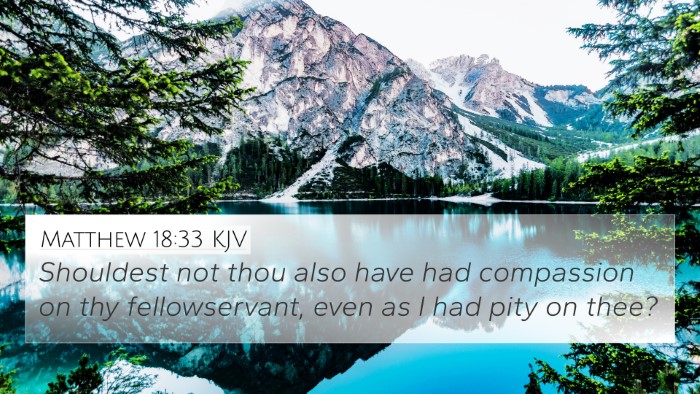
Matthew 18:33 (KJV) »
Shouldest not thou also have had compassion on thy fellowservant, even as I had pity on thee?
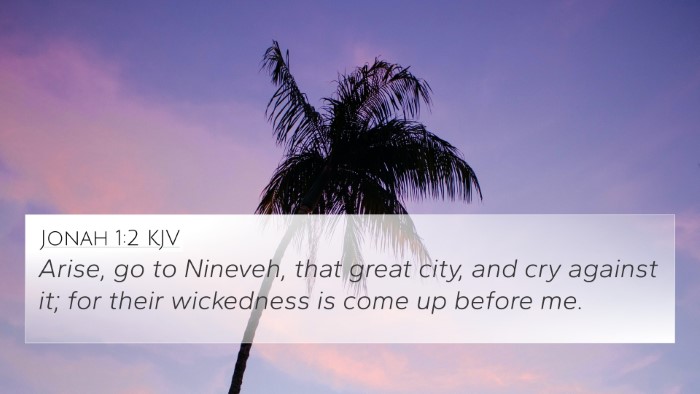
Jonah 1:2 (KJV) »
Arise, go to Nineveh, that great city, and cry against it; for their wickedness is come up before me.
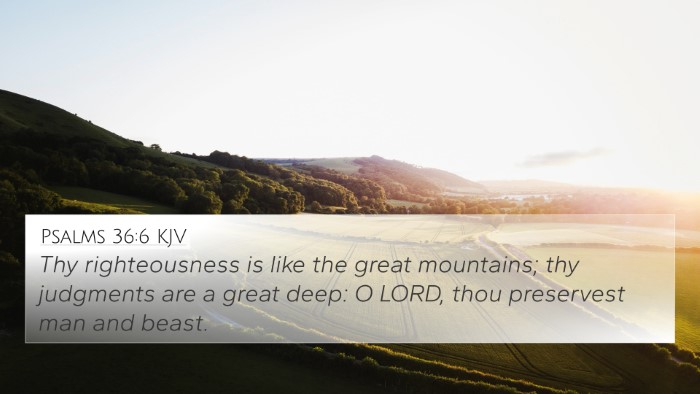
Psalms 36:6 (KJV) »
Thy righteousness is like the great mountains; thy judgments are a great deep: O LORD, thou preservest man and beast.
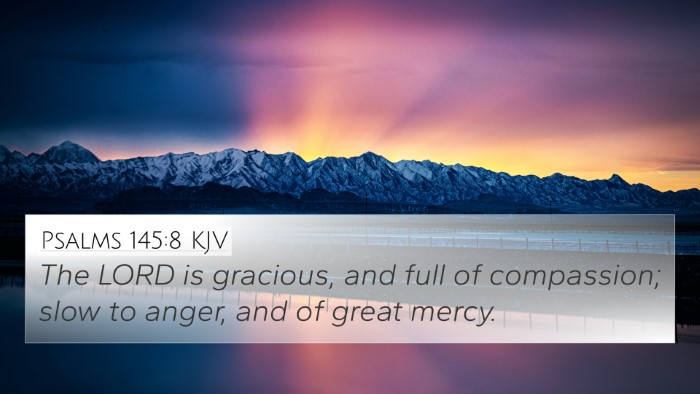
Psalms 145:8 (KJV) »
The LORD is gracious, and full of compassion; slow to anger, and of great mercy.

Deuteronomy 1:39 (KJV) »
Moreover your little ones, which ye said should be a prey, and your children, which in that day had no knowledge between good and evil, they shall go in thither, and unto them will I give it, and they shall possess it.
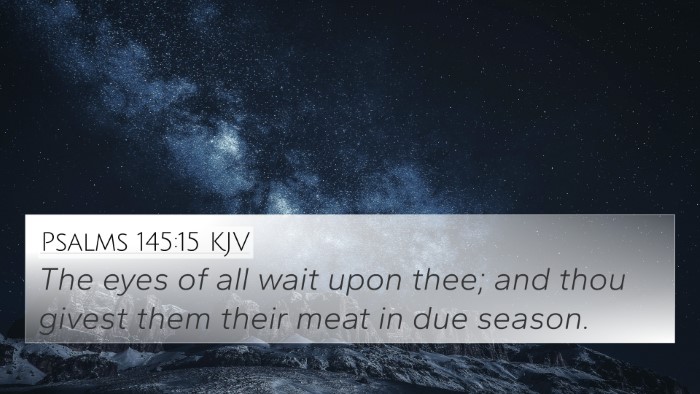
Psalms 145:15 (KJV) »
The eyes of all wait upon thee; and thou givest them their meat in due season.
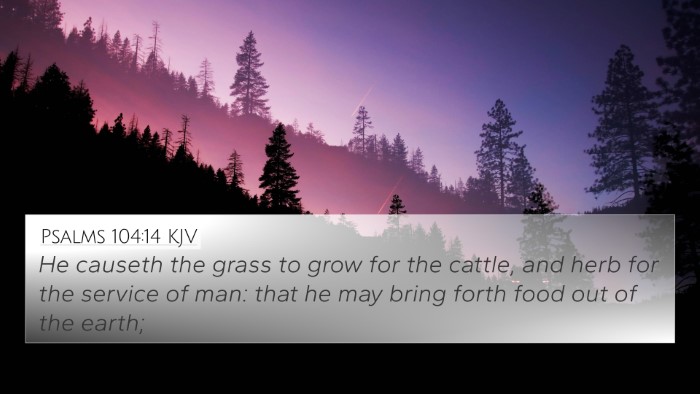
Psalms 104:14 (KJV) »
He causeth the grass to grow for the cattle, and herb for the service of man: that he may bring forth food out of the earth;
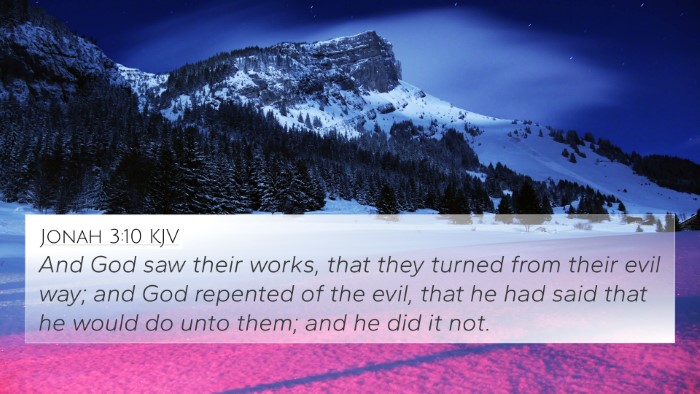
Jonah 3:10 (KJV) »
And God saw their works, that they turned from their evil way; and God repented of the evil, that he had said that he would do unto them; and he did it not.
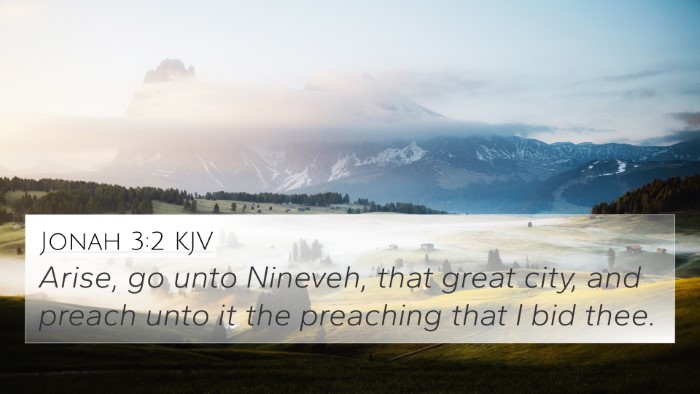
Jonah 3:2 (KJV) »
Arise, go unto Nineveh, that great city, and preach unto it the preaching that I bid thee.
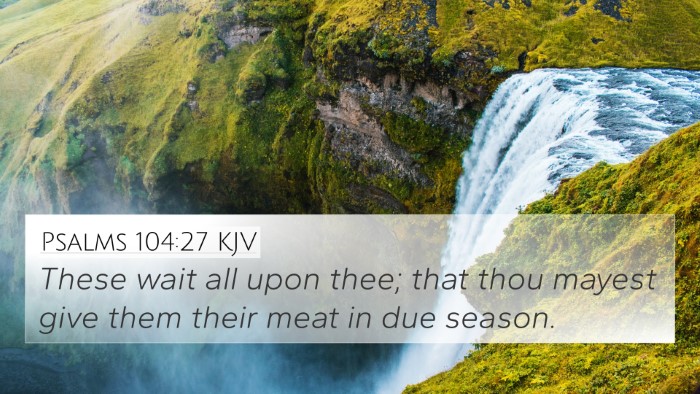
Psalms 104:27 (KJV) »
These wait all upon thee; that thou mayest give them their meat in due season.
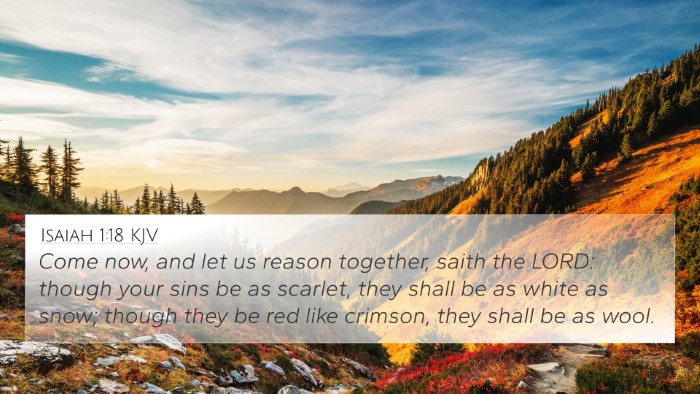
Isaiah 1:18 (KJV) »
Come now, and let us reason together, saith the LORD: though your sins be as scarlet, they shall be as white as snow; though they be red like crimson, they shall be as wool.
Jonah 4:11 Verse Analysis and Similar Verses
Understanding Jonah 4:11
Text of Jonah 4:11: "And should I not pity Nineveh, that great city, wherein are more than sixscore thousand persons that cannot discern between their right hand and their left hand; and also much cattle?"
Summary of Biblical Meaning
The verse Jonah 4:11 encapsulates the central theme of God's compassion and mercy, emphasizing the inclusiveness of His grace. In this passage, God expresses His concern for Nineveh, a city filled with individuals who, in their spiritual immaturity, are unable to discern right from wrong. This highlights God's desire for repentance and His longing that none should perish.
Commentary Insights
Matthew Henry's Commentary
Matthew Henry indicates that God's concern for Nineveh reflects His universal love and mercy toward all people, even those deemed enemies of Israel. This divine pity is directed towards both the innocent and ignorant, emphasizing God's compassionate nature. Henry also notes that the large number of people in Nineveh reflects a significant opportunity for repentance and demonstrates God's willingness to forgive.
Albert Barnes' Notes
Albert Barnes highlights that the phrase "should I not pity Nineveh" illustrates God's compassion towards sinners who lack understanding. He interprets God's question as a rhetorical device that underscores the importance of mercy over judgment. Barnes appraises the moral and ethical concerns related to Nineveh's ignorance, suggesting that God’s desire to save the city exemplifies the hope for all nations.
Adam Clarke's Commentary
Adam Clarke notes that the use of "more than sixscore thousand persons" signifies a large population that God views as valuable. He elaborates on the significance of the metaphorical "right hand and left hand," indicating moral discernment. Clarke emphasizes that God’s mercy extends beyond Israel, challenging the readers to understand and embody the divine compassion that God demonstrates towards all humanity, regardless of their status.
Connecting Bible Verses
Jonah 4:11 serves as a pivotal point in understanding God's mercy. Below are cross-references that illuminate this theme:
- Exodus 34:6-7 - God's declaration of being merciful and gracious.
- 2 Peter 3:9 - God's desire that none should perish, affirming His patience and mercy.
- Matthew 9:36 - Jesus’ compassion for the crowds, echoing God's concern for the lost.
- Luke 15:20 - The parable of the prodigal son shows a father’s compassion and forgiveness.
- Romans 5:8 - God’s love demonstrated through Christ while we were still sinners.
- Psalms 86:15 - Scripture expresses the merciful and gracious nature of God.
- James 2:13 - Judgment without mercy to one who has shown no mercy, emphasizing the need for compassion.
- Isaiah 55:7 - Encourages the wicked to forsake their ways and return to the Lord, who will have mercy.
- Luke 6:36 - Jesus commands to be merciful as the Father is merciful.
- Micah 7:18 - God delights in showing mercy, reinforcing the theme from Jonah's story.
Thematic Implications
This verse not only reflects the character of God but also challenges believers to examine their own responses to others, especially those considered undesirable or outside of their community. The overarching theme of God's love for Nineveh can invite a deeper understanding of how to live out mercy and compassion.
Conclusion
In reflecting on Jonah 4:11, we are reminded of the vastness of God's love and mercy that extends beyond our understanding and boundaries. The call to compassion is a direct challenge to the attitudes many may have, urging us to consider how we, too, can embody God's heart for the lost and the ignorant. As we look at the cross-references noted, we can see the interconnectedness of Scripture that affirms the consistent message of divine compassion throughout the Bible.
